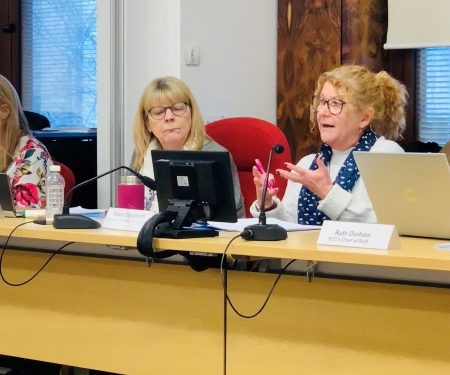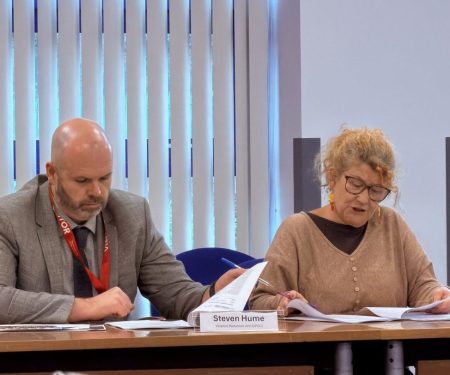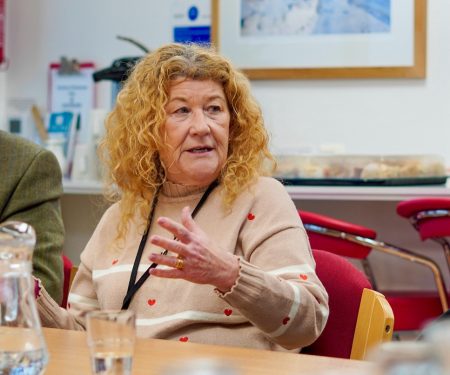“Young people shouldn’t have to say they are at the brink just to get the help they need”, warns Police and Crime Commissioner, Kim McGuinness as she calls on Government to urgently invest in young people and their futures
CONCERNS for the mental health of children in the Northumberland, Tyne and Wear have been raised by PCC Kim McGuinness, as new research also shows children in deprived areas are struggling to cope.
A national survey of more than half a million children across England revealed this week found that one in five children are unhappy with their mental health.
The national report comes just days after the Police Commissioner’s local services report, which pulls together the views of almost 100 North East youth work organisations, revealed that 78% of organisations are dealing with more young people displaying mental health concerns now than in 2011, following a decade of cuts to youth services.
They also said that now, more than ever, they are having to provide support to young people with increasingly complex mental health issues.
Overall, the report, conducted as part of Kim McGuinness’s preventing crime strategy, reveals a bleak outlook in terms of support for the younger generation.
In fact, 71% of the youth organisations surveyed have seen their funding cut or reduced since 2011. Overall there has been a 75% decrease in local authority spending on youth services in Northumbria since 2011. This means funding has been slashed by £31.5 million pounds.
These findings have prompted the Commissioner to call on the Government for an urgent rescue strategy, to save the youth sector and young people from losing their way and provide early mental health support for those who need it.
Northumbria Police and Crime Commissioner, Kim McGuinness, said: “Poverty, deprivation, poor health, mental health and a lack of youth services– it’s all interlinked with crime and becoming vulnerable to it. Anyone who says these are excuses is wrong, these are often the root causes. You leave youth services to struggle; you leave young people to struggle. They go on to struggle as adults, as families, as entire communities. It’s that simple.
“South Tyneside and Sunderland, and Northumberland, Tyne and Wear are amongst the worst in the country for mental health treatment waiting times. This coupled with staff shortages means youth workers are telling us they are being forced to fill the gap in trained counsellors. It’s problem after problem. We hear that there is a mental health crisis happening and these findings show that is very much the case.
“Youth services and mental health support need to kick in early – before kids reach the youth offending service and before they get a drug and alcohol misuse service referral. We need to prevent things getting so bad that a social worker has to step in and intervene with their lives.
“The system is so very flawed if people need to be saying they are at the brink for the help to kick in. And we mustn’t forget the vulnerabilities – people with mental health problems are more likely to be victims of violent crime, rather than perpetrators. We find they are often preyed upon and get drawn into County Lines.”
“It’s the support and opportunities outside the home are critically important. Youth services can be a safety net catching children before they fall into crime or become a victim to crime. Our region, sadly, has some of the highest levels of deprivation in the country, and this impacts upon our wellbeing and mental health.”
The Police Commissioner added: “All too often the police and their 24/7 availability are left to pick up the pieces at the end of that 999 call, coming to the aid in moments of real crisis but it’s like things are being allowed to get that bad. We have youth services bridging the gap too, some really amazing ones but it’s not – nor should it be – up to them or the police alone.
“My Violence Reduction Unit is tasked with improving lives to prevent crime and I will make sure we are doing everything we can when it comes to supporting the next generation. You take away youth services you take away the opportunity to intervene. Problems we have will persist, or worse still, grow and we can’t let that happen in Northumberland and Tyne and Wear.”
To read the findings in full and the recommendations set out by the PCC please visit:
Voices from the Frontine – A report into the future of youth services
ENDS
Notes to editors
Key findings from Voices from the Frontline:
- 75% have seen their central/local Government funding cut/decreased
- 45% have seen their staffing levels decreased since 2011
- 41% report being in a worse financial position than in 2011
It features a series of key recommendations on how Government, local authorities and PCCs can come together to support future generations. These include:
- The Government should appoint a minister who has a portfolio focussed on youth services.
- Youth services should be backed with urgent Government investment in the next Comprehensive Spending Review.
- The Government should devolve the funding and powers needed to create localised youth strategies in collaboration with young people themselves.
People working with young people have shared their thoughts on topics such as funding cuts, staffing levels and concerns for future generations. Findings include:
- 82% of respondents believe safe locations for young people to gather and meet would help prevent those involved from falling into a life of crime.
- 77% stated that there needs to be an increase in youth services in their local area.
- 63% said that more employment and skill development opportunities were required to prevent youth criminality.
Other information of note:
- The Big Ask Survey by the Children’s Commissioner found more than half a million children across England revealed this week found that one in five children are unhappy with their mental health.
- The NHS Digital report What About YOUth? Survey, taken from PHE Fingertips
estimates that around 9.2% of 5-16 year olds in England have a mental health disorder, with the prevalence in the North East predicted to be slightly higher at 10.0%.
- A report from Public Health England stated that for every £1 spent on identified prevention activities, the returns are often double that.
- According to mental health charity Mind, people with mental health problems are three times more likely to be a victim of crime.







